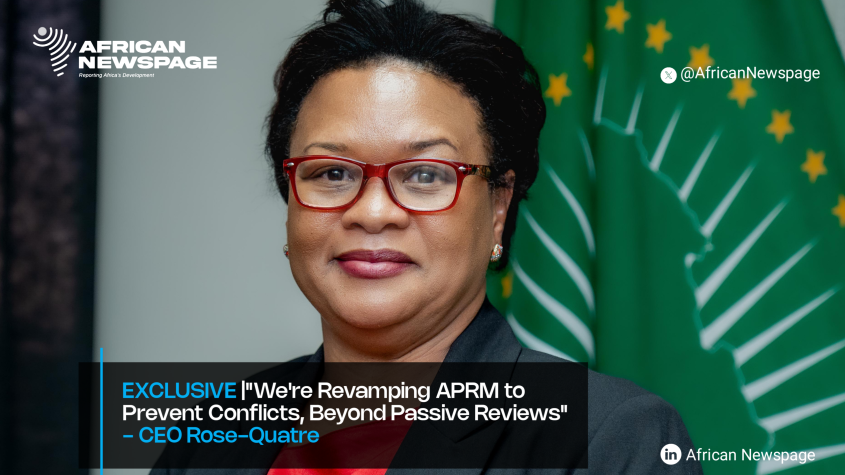EXCLUSIVE | “We’re Revamping APRM to Prevent Conflicts, Beyond Passive Reviews” – CEO Rose-Quatre
Amb. Marie-Antoinette Zitane Rose-Quatre, Chief Executive Officer of the African Peer Review Mechanism (APRM), has over two decades of experience across politics, diplomacy, public policy, management as well as media and communications. Her career includes stints as a journalist, a politician, a Member of Parliament as well as the accredited Ambassador of Seychelles to several African Union Member States.
On her first anniversary as CEO of APRM, the reform-minded diplomat speaks exclusively to African Newspage on her efforts to address the APRM’s myriad institutional challenges in a bid to reposition the Mechanism to deliver on its mandate of advancing the state of governance across AU Member States.
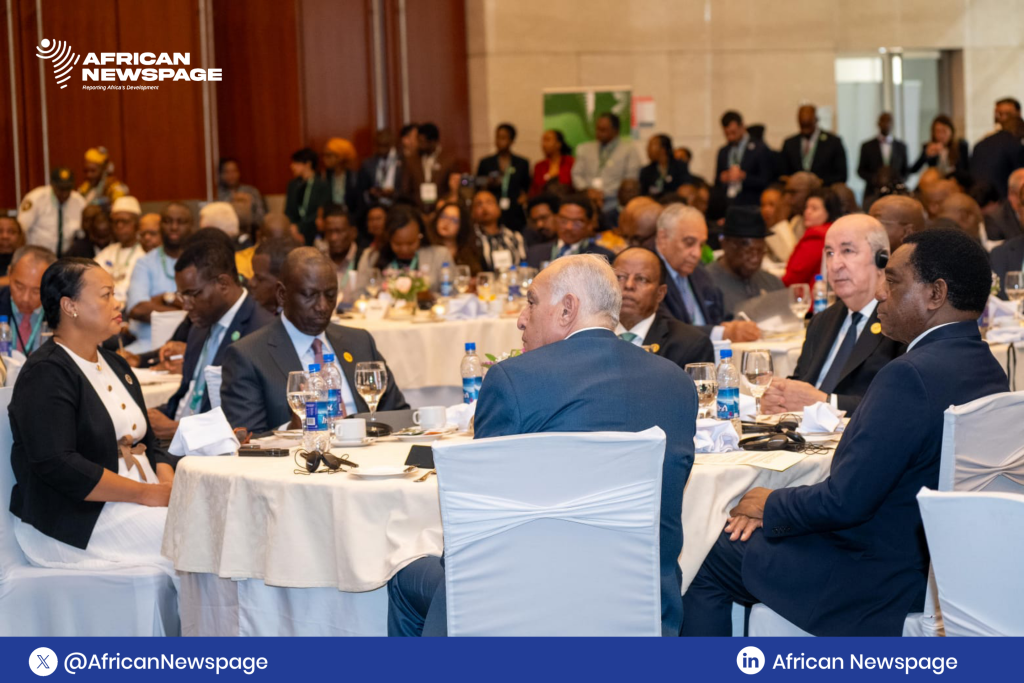
Newspage: Looking back on your first year as CEO of the APRM, what would you highlight as your most defining accomplishments, particularly in light of the operational and financial restructuring initiatives launched under your 3P Strategy?
Rose-Quatre: When I assumed office on June 3, 2024, I was very clear-eyed about the challenges ahead. The APRM was at a defining moment, transitioning from a process-oriented institution into a dynamic, impactful mechanism capable of influencing governance outcomes across the continent. To steer this transformation, I introduced the 3P Strategy: Professionalism, Performance, and Probity as the core values guiding our operations. These principles informed the development of our 2025-2028 Strategic Plan, a forward-looking blueprint for repositioning APRM into a results-driven institution.
One of our key milestones was the APRM Impact Assessment, which was initiated in 2023 and completed in 2024. The study’s findings offered a realistic appraisal of our strengths and areas for improvement. They became the foundation upon which we built our new strategy, which integrates the AU’s Balanced Scorecard and is aligned with the Second Ten-Year Plan Implementation Plan of Agenda 2063. The strategy is designed to deliver tangible outcomes. For the first time, we are tracking impact using harmonized indicators across the African Union governance ecosystem.
Another proud achievement was hosting the first physical APRM Forum in five years, where Heads of State engaged directly with one another in peer reviews. This restored the political ownership of the Mechanism’s core function. We also finalized the Africa Governance Report 2025 (AGR25), focusing on the governance of Africa’s land, marine, and mineral resources. This report was validated by experts and eventually adopted by the AU Assembly of Heads of State and Government. Its development exemplifies our new evidence-based, expert-led approach to research and reporting.
At the same time, we introduced e-governance as the sixth thematic area of the APRM, reinforcing our commitment to digital transformation in governance processes. We also launched technical support missions and helped countries to prepare for and implement their reviews.
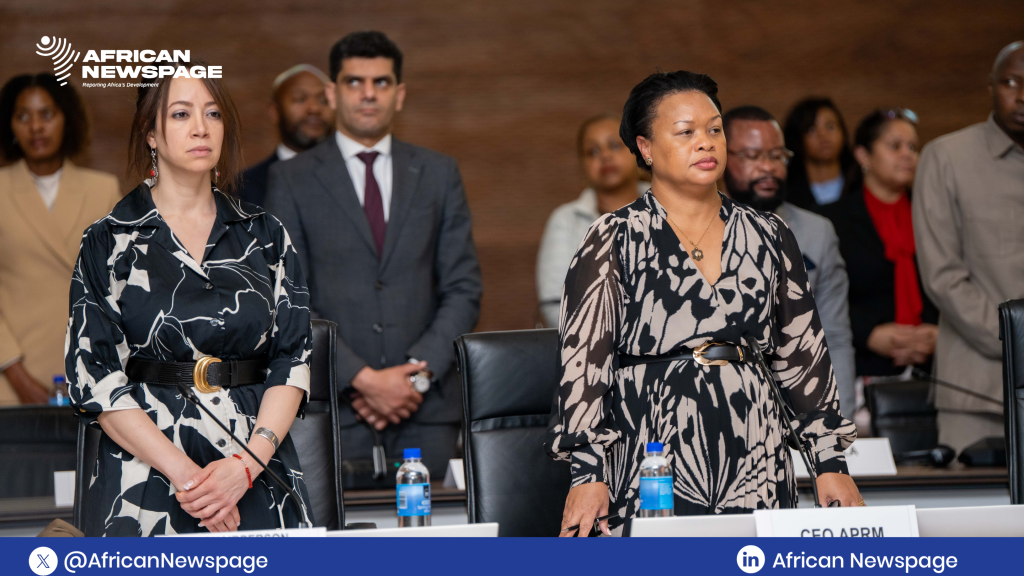
Newspage: During the 9th Ordinary Session of the APR Focal Points Steering Committee meeting, you emphasized internal audit reforms and resource prudence. Could you elaborate on the significance of the standing committees (Audit, Budget, Restructuring) in strengthening the operational effectiveness of the APRM Continental Secretariat?
Rose-Quatre: Institutional transformation must begin from within. One of my first administrative priorities was to address operational inefficiencies and low staff morale, which were confirmed by a staff perception survey. To this end, I established three key Standing Committees: the Internal Audit and Financial Oversight Committee, the Internal Budget Committee, and the Restructuring Committee. These committees are very crucial in ensuring transparency, effective resource allocation, and internal accountability if the job must be done.
To further institutionalize coordination, I took the initiative to begin holding weekly meetings with heads of units and divisions, while empowering the Executive Management Committee (EXCO) to lead the internal transformation agenda. This helped realign our leadership with our strategic goals. Moreover, we scheduled a staff retreat to address morale, professional development, and the cultivation of a work culture built on discipline, integrity, and hard work. These internal reforms were designed not just to address present gaps but also to institutionalize a culture of excellence for the long term.
This operational streamlining also supports our broader goals of financial prudence. Hosting the 9th Focal Points Steering Committee within our premises in Midrand was not just symbolic; it was part of our effort to cut costs and align with austerity measures advised by Member States and partners. By building a culture that really focuses on results within our secretariat, we are practicing what we preach in governance terms.
In a nutshell, the formation of these standing committees is part of our long-term vision to transform the Secretariat into a well-oiled and efficient institution. These reforms are essential in positioning the APRM as a reliable instrument of the AU and a trusted governance advisor to its Member States.
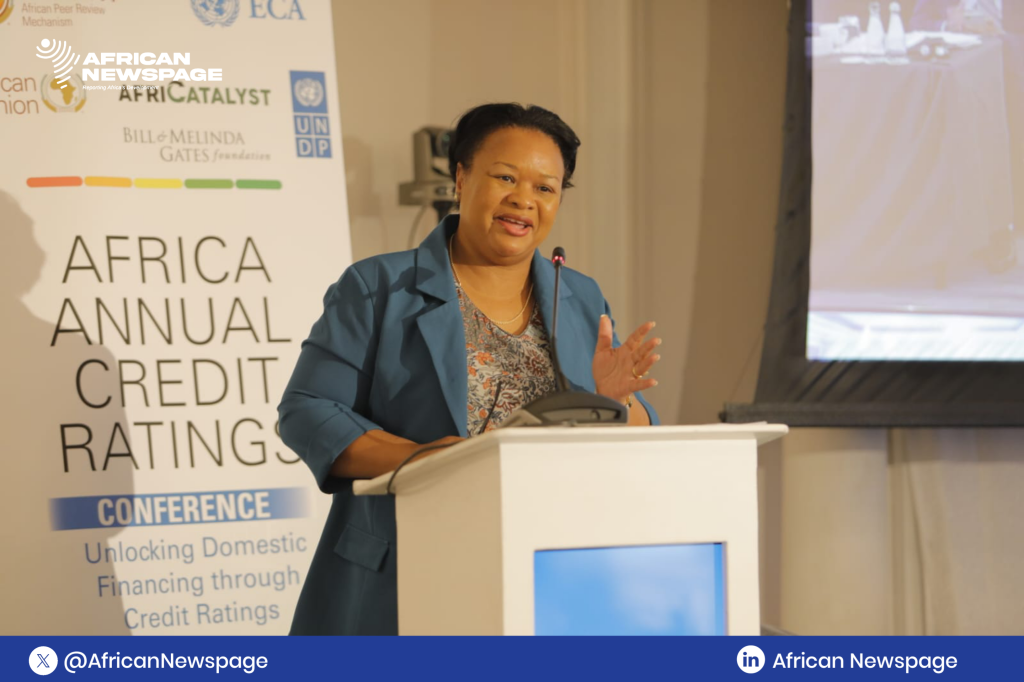
Newspage: In your address to the recent 2025 Annual Conference on Credit Rating, you spoke about the need for Africa-centered financial credibility. How is the APRM positioning the Africa Credit Ratings Agency (AfCRA) to serve as a credible alternative to international credit rating agencies?
Rose-Quatre: The establishment of the Africa Credit Ratings Agency (AfCRA) represents a monumental shift in how African countries can shape their financial narratives. For years, many African nations have been subject to external credit assessments that often overlook local realities and institutional improvements. Having secured AU’s approval, AfCRA is now on track for operationalisation in the next 12 months, and the APRM has been playing a lead role in laying the groundwork for its operations.
In the last one year, we have provided technical advisory support to seven AU Member States, including Ghana, Egypt, Cameroon, and South Africa, helping them set up national credit rating liaison teams. This is important because AfCRA is not just a top-down institution; it must be rooted in strong country-level structures. We’ve also created two continental information-sharing platforms for peer learning, hosted expert meetings in Zambia and Egypt, and led a dialogue on credit ratings in New York on the margins of the UN General Assembly, in Washington during the World Bank Spring Meetings and recently in Cape Town at the first Africa Annual Conference on Credit Ratings.
Furthermore, the APRM Credit Rating Advisory Services Programme, adopted in Lusaka in March 2024, has been instrumental in preparing Member States for engagement with both AfCRA and global financial markets. This programme gives countries the tools and advice they need to understand how credit ratings work, figure out how to improve them, and see how their policies affect those ratings.
Through this initiative, we are working towards a future where African countries won’t be unfairly judged because of missing context in global assessments. AfCRA fits into our bigger goal of boosting Africa’s independence and economic strength, and we’re putting in a lot of effort to make sure it becomes a key part of Africa’s development plans.
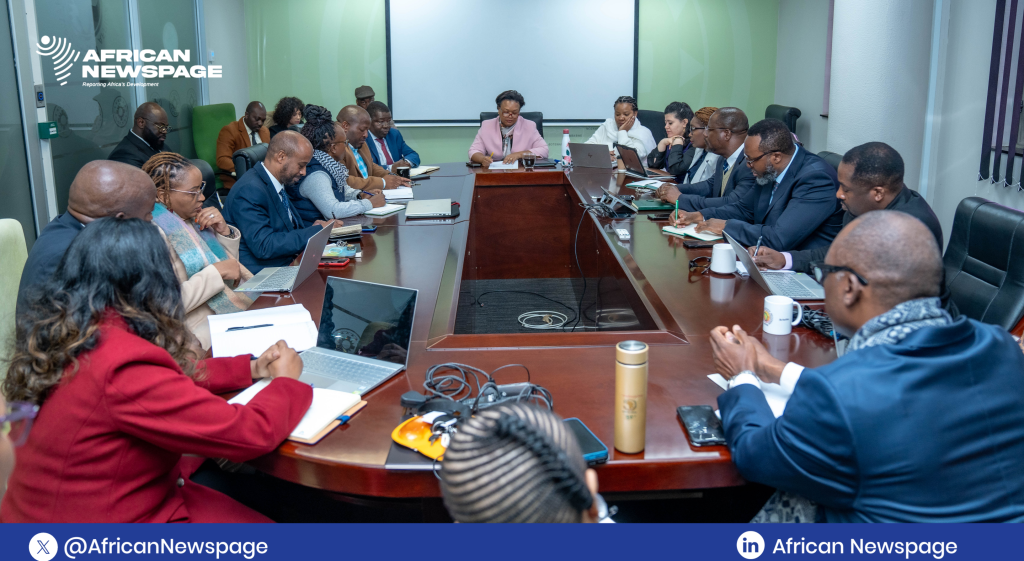
Newspage: The four key pillars of the 2025–2028 Strategic Plan focus on institutional strengthening and early warning systems. Could you walk us through how these pillars are being implemented in countries experiencing political transitions or governance instability?
Rose-Quatre: The four strategic pillars are 1: Delivering the APRM Mandate with Tangible Results; 2: Institutional Strengthening; 3: Partnerships and Resource Mobilization; and 4: Advocacy, Communication and Early Warning. They constitute the backbone of our 2025-2028 vision. Each is designed not just to direct internal processes, but to shape meaningful engagement with Member States, especially those in transition or under governance strain.
For instance, under Pillar 1, we have supported Gabon during its political transition, working closely with its newly elected National Governing Council (NGC). This resulted in a roadmap for a targeted review focused on governance challenges and a planned return to democratic constitutional order. Under Pillar 2, we scaled up the roll-out of APRM Knowledge Hubs, first virtually in Namibia, then physically in Ghana and Egypt. These hubs support capacity development and institutional memory at the national level.
We also launched a monitoring and evaluation e-training module, reaching over 1,000 youth participants in English-speaking African countries. The next phase is to target the French and Arabic-speaking regions. In the area of research, we have finalized two National Governance Reports (NGRs) for Senegal and Namibia, contributing to a better understanding of institutional performance in those contexts.
Importantly, it is worth noting that our work now links APRM diagnostics with AU early warning mechanisms, including the Continental Early Warning System (CEWS) and the Africa Peace and Security Architecture (APSA). This means that when issues related to structural and dynamic vulnerabilities are raised in governance reviews, they can spark vital discussions across the continent and lead to early action when needed. That is how the APRM is evolving: from assessments to action.
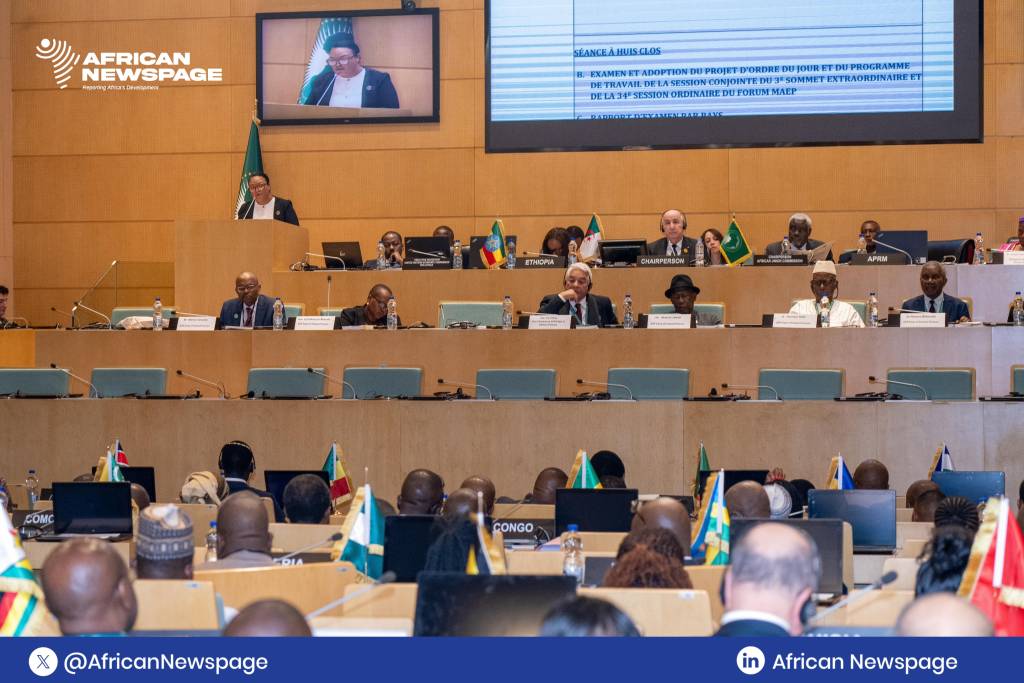
Newspage: In your recent address to the APR Forum, you emphasized the need to shift from conflict response to conflict prevention, citing Sudan as a case where early governance interventions could have altered outcomes. How is the APRM under your leadership working to strengthen early warning systems and ensure that review reports translate into timely, preventive governance action across Member States?
Rose-Quatre: The case of Sudan is a heartbreaking example of what can happen when governance warnings are ignored. Our 2017 Country Review Report on Sudan clearly highlighted deep-rooted challenges in establishing democratic civilian oversight of the security forces. Later, in 2020, the Governance Gap Analysis warned of the deteriorating relationship between the state and its citizens. Had these recommendations been acted upon, we might have averted the crisis that has now displaced millions.
This is why we are moving APRM from a mechanism of passive review to one of proactive prevention. Under my leadership, we are aligning our reports and findings with AU instruments such as the Continental Early Warning System (CEWS) and the Africa Peace and Security Architecture (APSA). Our governance reviews are no longer an end in themselves; they are tools for early response, planning, and reform.
We are also in the process of finalizing the legal instruments necessary to operationalize the APRM Governance Support Programme, a funding mechanism designed to support governance accelerators in three key areas: the implementation of National Plans of Action (NPoAs), the advancement of national reform agendas, and the conduct of national governance assessments. This initiative aims to ensure that APRM findings are actively translated into action and do not remain unused or overlooked.
Ultimately, our goal is to shift Africa’s governance paradigm from reactive to preventive. We must not wait until institutions collapse before intervening. If APRM is to remain relevant in this new era, we must become a proactive mechanism, not just a reporting agency. And that is exactly the transformation we are undertaking!
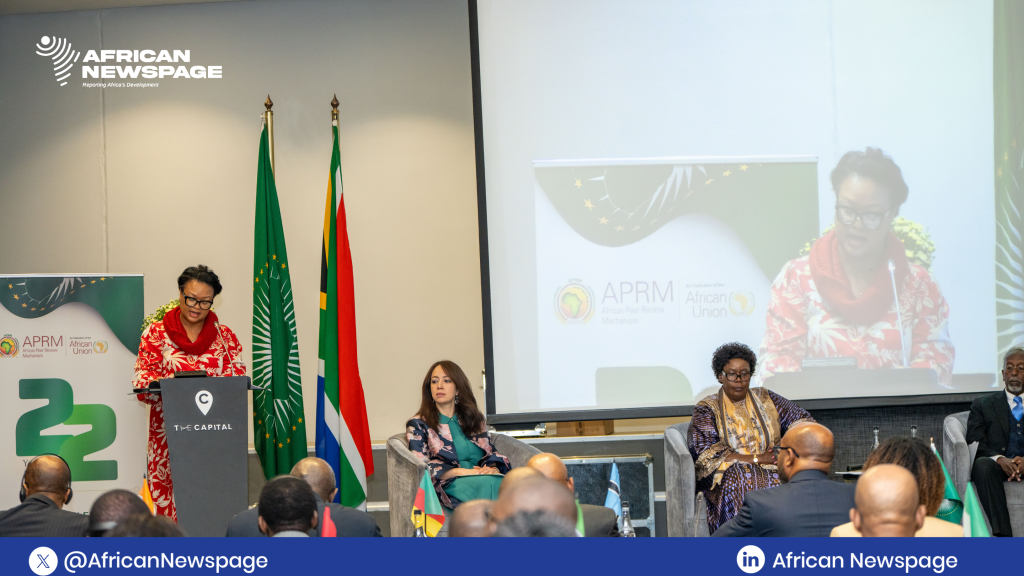
Newspage: Despite notable achievements, the APRM continues to face budgetary constraints and limited Member States’ contributions. What steps are you taking to mobilize more domestic financing and strengthen partnerships to guarantee the Mechanism’s long-term effectiveness?
Rose-Quatre: Financial sustainability is a matter of institutional survival. As it stands, only 20% of APRM’s funding comes from statutory contributions by AU Member States, while the remaining 80% comes from partners. This model is unsustainable and exposes the APRM to operational uncertainty. My approach has been to confront this challenge head-on by mobilizing both political and technical support for a restructured budget model.
We have deepened our engagement with the AU’s Committee of Fifteen (F15) Ministers of Finance and briefed the Permanent Representatives Committee (PRC) to build consensus around flexible budgeting frameworks. These efforts are geared towards ensuring that critical governance programs are not hindered by bureaucratic constraints. We also had a retreat with the AU Committee of Experts to foster better understanding between the APRM and AU finance institutions.
Encouragingly, countries like Algeria have responded with strong support, contributing US$1 million voluntarily, a move we deeply appreciate. Other countries such as Lesotho, Togo and Senegal have also contributed significantly. We continue to urge all Member States to clear their arrears and prioritize their contributions to the APRM budget. Our partners, including the European Union (EU) and African Development Bank (AfDB), have also stepped up with financial audits and project-based funding support.
Internally, we have tightened controls through audits, adopted more efficient use of virtual platforms, and ensured that every cent spent adds strategic value to our institutional goals. We will continue to pursue a diversified funding strategy, one that balances AU ownership with sustained partnerships and transparent financial governance.
Newspage: As we conclude, what is your long-term vision for the APRM, and what message would you like to leave with African citizens, particularly civil society, about the Mechanism’s future?
Rose-Quatre: My vision is to see the APRM firmly established as Africa’s foremost governance reference point: respected, responsive, and results-driven. I envision a Mechanism that not only diagnoses governance challenges but also supports countries in delivering reforms that citizens can feel in their daily lives. The APRM must become a trusted advisor to Member States, a space for courageous conversations among Heads of State, and a platform where civil society’s voice is not just heard but valued.
To Africa’s citizens, and especially to civil society, I say this: governance is too important to be left only to governments. The APRM belongs to all of us. Your continued engagement is not only welcome, it is essential. Together, we are shaping a future where transparency, accountability, and participation are the cornerstones of governance across the continent. That is the Africa we are building. And the APRM is proud to help lead the way.

